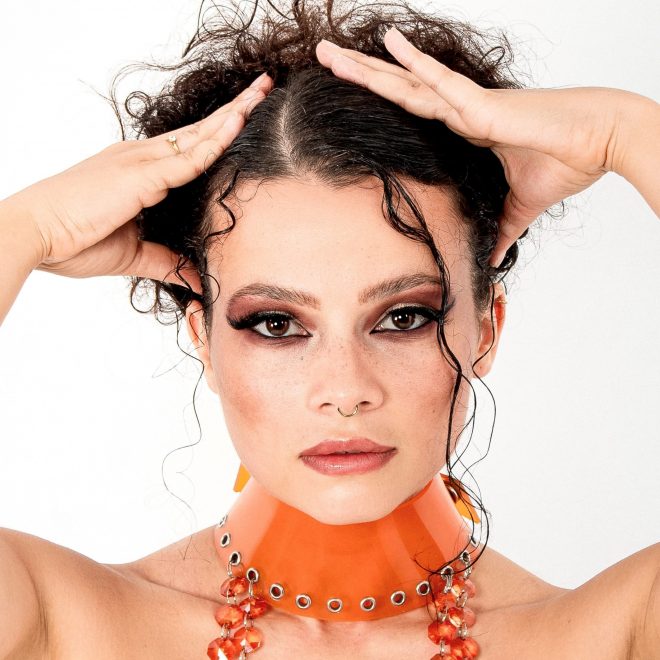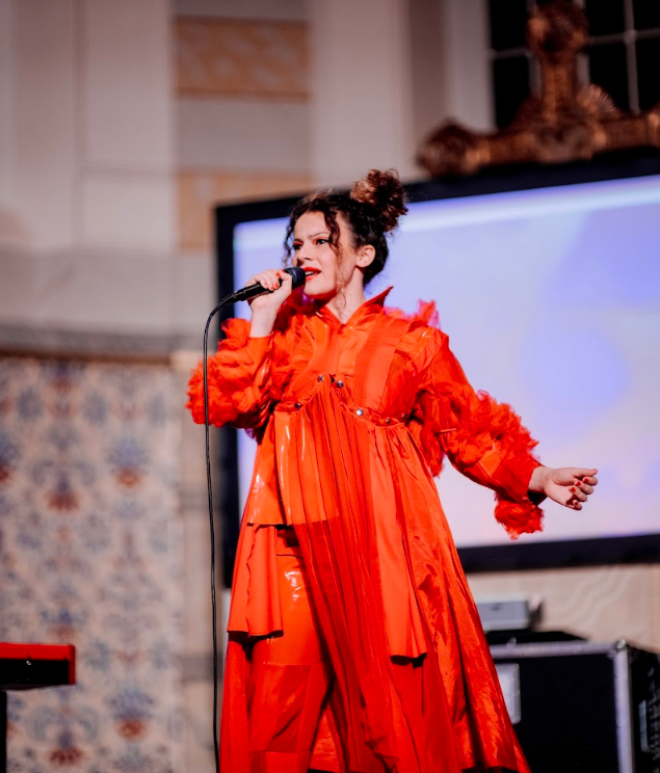Laura Korinth

@DEANTHONN
Raised within the confines of a high-control religious group, Laura’s early life was defined by duality: sermons by day, underground clubs by night. These formative contradictions didn’t break her—they built her. In that friction, she forged a sound that is raw, cinematic, and unflinchingly hers.
More than just an electronic artist, Laura is a self-taught producer, a poet, a researcher, and a storyteller. She is part of a new vanguard of female producers refusing to be tokenized, refusing to be compartmentalized. What happens when someone grows up silenced and finds a microphone? What does it sound like when authorship becomes an act of defiance? Laura answers those questions not with slogans, but with sound.
In this rare and unfiltered conversation, she speaks with urgency and grace about her past, her process, and the refusal to be anyone else’s voice. For anyone who’s ever felt like they didn’t belong—or like their story didn’t matter—Laura’s work is a reminder: the most powerful art often comes from the spaces in between.
The title Between the Worlds suggests both a literal and metaphorical space—between visibility and obscurity, tradition and reinvention, past and future. Can you share how this idea reflects your own lived experience and how it guided the emotional architecture of the EP?
“I have always existed in between—between church and club, control and absolute freedom, silence and ecstatic sound. This duality shaped me, molded my sound, and defined my artistic identity. My EP “Between the Worlds” is scheduled for release this summer. It represented the journey of transformation and the spaces I´ve navigated.
Leaving a High-Control Group where I grew up was the first step toward truly living music—a breakthrough that allowed me to create my world. In this world, there are no limitations, no filters, no compromises—just raw, unfiltered expression.
Even my fake ID days, sneaking into underground clubs while still attending church during the day, were a reflection of living in parallel worlds. Back then, techno was raw, unpolished, and unapologetic. It was still for outcasts. You had to defend your choices. That friction defined me.
Between the Worlds is exactly that: neither here nor there, but something entirely new—entirely mine. My roots span continents—Amazonia, England, and Germany. It’s not just an album title; it’s a declaration of self-determined existence. In these in-between spaces, I found my freedom.”
You’ve taken the rare path of full creative autonomy—writing, producing, arranging, and mixing everything yourself. Was this a conscious act of resistance, a necessity, or something else entirely? How has that solitude shaped your relationship with sound and self?
“It was absolute resistance. I didn’t want to just sing—I wanted to build, create, and control. I refused to be just a voice in someone else’s vision. No compromises, no external influences—just me.
My first step into the industry was with the track Gravity, working together with Boris Brejcha. It gave me my first glimpse of the international stage and showed me what was possible. It was my first real experience of what it means to create music on an international level.
I joined a jazz band, experimented with blues, and even played in a punk band for a while in Berlin. Those experiences taught me that music is limitless, but to create my vision, I had to be the one in control. I realized that to express what I wanted truly, I had to learn everything myself.
That’s when I knew—I wanted to be the architect of my sound. No compromises, no external influences—just me.
It also made me realize that I wanted to create my vision - to be the architect of my sound. I didn't want to be just a part of something.
In an industry where women are often sidelined, I wanted to be more. And most importantly, I wanted to be free. That’s why I do everything myself—from the first spark of an idea to the final mix. It’s not just about control; it’s about purity. My music is unfiltered, raw, and untouchable. In a world that glorifies shortcuts and ghost productions, I chose the long path. It’s more work, but it makes me feel alive.”
Coming from a background where access to the outside world—and especially artistic freedom—was heavily restricted, what did it take for you, emotionally and mentally, to begin making music at all? Do you remember a moment when sound became a form of survival or rebellion?
“My first concert was Crystal Castles in a pub with 30 people. I was 15. The first act I saw live in a club was Johannes Heil. Those moments burned into my memory. Electronic music was my rebellion and the door to another world. The defining moment was The Prodigy. I got the CD secretly from a boy in the religious community—for me, it was pure rebellion.
I still remember my beginning—when I discovered my voice for the first time. I was coming out of a club, drunk, running to a street musician, grabbing the mic, and just singing. It wasn’t planned—it was survival and instinct. Music became my breath, my only way out. When you have nothing, you create something.”

@ANIKAKRBETSCHEK
Your production style is deeply intuitive, often built from field recordings, analog machines, and non-linear structures. What does your process look like when no one’s watching—what happens in that private space where raw ideas become form?
“When I produce, it’s like archiving my life. I work with analog machines and field recordings—I want it raw and unpolished. My tracks are like living memories—moments, moods, places. I don’t plan; I just let it flow. I dance in the studio, play synths, piano, and sing random stuff—just record what feels real.
My uncle Mike Gerald, who was part of the legendary Sounders Department, passed on his analog synthesizers to me. His spirit lives in those machines: the Deepmind12D and Prophet 08. They are part of my creative DNA. My studio is my sanctuary, a place where memories are transformed into sound, where rebellion and survival echo in every beat.”
There’s a quiet kind of defiance in your refusal to follow trends or conform to what’s expected of a female electronic artist. Have you ever felt pressure to present your work differently—or to explain yourself in ways male producers never have to?
I never tried to follow a trend. For me, it was always about feeling and listening to myself, creating something real. My sound is a modern interpretation of old-school
electronic music, blended with elements of rituals, film, mythology, and even poetry. My published German poetry book “Der späte Vogel zwitscherte” was an extension of that—a way to document my existence outside of traditional structures, where I translated these in-between worlds into raw, unfiltered words.
Sometimes that way between worlds means isolation, being misunderstood—but that’s my shield—authenticity over adaptation. When I started, being in the underground meant you were an outcast. I never wanted the costume; I wanted the raw experience.
“In the context of your past, where control and limitation defined so much of life, what does authorship mean to you now? When you release a piece of music into the world, what are you reclaiming?
Authorship is power. It’s self-determination. Creating music is the only place where no one can control me. I can only control myself. I archive everything: my tracks, my process, my stories. I have secured my work in archives in Germany and South America to make them visible for future generations and to prevent them from being erased. It’s a personal statement, a refusal to disappear.
Every release is more than just a song—it’s a reclaiming of my story, my voice, my existence. This idea also led me to my academic research on discrimination Against Women in the Music Industry. My findings are not just research—they are a testament to self-determination. I don’t just create; I document. I protect. I remember.”
You’ve said your music feels like a hybrid between a film and a memory—something immersive, imagined, but rooted in truth. How do sci-fi and mythology help you tell stories that perhaps couldn’t be told through autobiography alone?
My fascination with mythology began with my real surname, Korinth, leading me to the ancient city of Corinth—a symbol of independence and resistance. The Temple of Aphrodite and the fortress of Acrocorinth represent strength, mysticism, and a deep connection to spirituality.
‘Bride’, for example, is a convergence of influences: Goethe’s ‘The Bride of Corinth’, the story of Penelope from Greek mythology, and my oath & heritage. I even wove elements of the Arawak language into the track—a bridge to my roots, connecting past and present.
Mythology is more than just storytelling; it’s a framework where truth and imagination collide. It gives me the freedom to reflect reality through symbolism, allowing stories to exist in the spaces between words. Transformation is my Phoenix, Angel, my dystopian vision inspired by Pat Cadigan. My music is not just sound—it’s an archive of my mythology.
What would you say to other women—or anyone—who comes from a place of restriction or erasure and wants to create something of their own?
Build your own space, even if it’s just a sound card, a MIDI keyboard, and a laptop. Document everything—archive it, timestamp it, secure it. Your story matters. Create your world—even if it’s between worlds. I learned to turn my experience and my past into my superpower. The things that were meant to silence me became my voice, my sound, my strength. And that’s the message: your story is your superpower—don’t let anyone write it for you.


